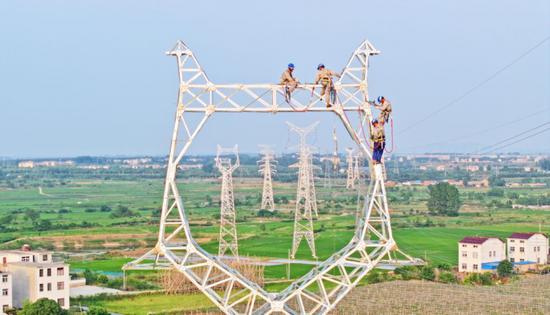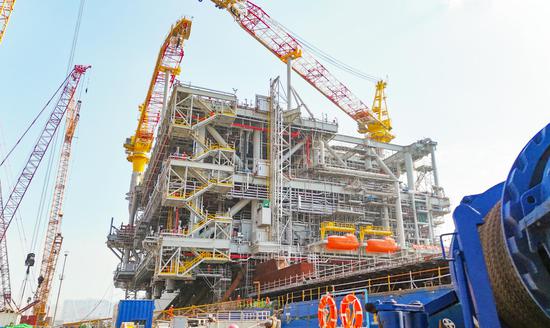
Technicians check a power transmission tower in Chuzhou, Anhui province. (SONG WEIXING/FOR CHINA DAILY)
While the energy demands of artificial intelligence present challenges to global climate goals, experts highlight the significant opportunities AI offers the energy industry, as the technology is poised to enhance the integration of renewable sources into the grid and optimize energy consumption.
Yu Xiaohui, head of the China Academy of Information and Communications Technology, a Beijing-based think tank, said, "Further efforts are expected to actively integrate China's energy sector strengths — technologies and manufacturing — with data resources to explore and innovate AI applications across various scenarios in the energy industry."
Zhou Fanke, director of energy at Huawei's computing power division, said: "China is still in the exploratory phase of AI's role in the energy industry. Building large-scale AI models in the power sector is expected to address challenges from the wide adoption of unstable renewable sources like wind and solar, and ensure the stable operation of power systems in a way that leverages AI to predict power generated from unstable renewable sources and effectively coordinates across power generators, grids, users and electricity storage systems."
Zhou said the use of large-scale AI models in the energy industry currently focuses on three main areas: power grid inspections, operations and maintenance, and customer service. However, there are still challenges, such as suboptimal performance in power scheduling including low accuracy levels. Innovations in top-level architecture are needed to enhance application efficiency.
Shi Hang, director of the Wind and Solar Resource Assessment Center at the CSSC Science and Technology Co Ltd, highlighted AI's crucial role in assessing, developing and utilizing offshore wind resources.
"Future developments in AI technology in the wind energy sector will focus on enhancing data analysis capabilities and improving power generation prediction algorithms. These advancements will lead to better energy efficiency, reduced operational costs, increased renewable energy applications and support for smart grid development," Shi said.
Shi added that offshore wind projects often involve large exploration areas with limited spatial coverage from single-point measurements, and typically short measurement periods. Additionally, the high costs and long construction periods of offshore meteorological towers, as well as limitations of current wind speed simulation methods also affect project development.
To address these issues, CSSC Science and Technology has introduced AI-powered Synthetic Aperture Radar to provide a basis for planning future offshore wind projects, with an anticipated reduction in costs by about 50 percent in 200 square kilometer sea areas.
"AI will significantly enhance data analysis capabilities in the wind energy sector, especially in predictive maintenance and fault detection. The complex operational conditions and environments of wind turbines require extensive data for monitoring and analysis. In the future, AI will be able to identify potential risks earlier, allowing for preventive maintenance before problems occur," Shi said.
"Additionally, AI can optimize wind energy equipment operations by analyzing extensive operational data to determine the best parameters and improve generation efficiency. This data-driven optimization will become a key trend in the wind energy sector," Shi added.


















































 京公网安备 11010202009201号
京公网安备 11010202009201号